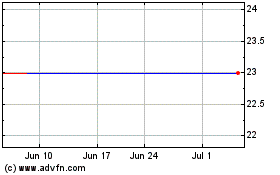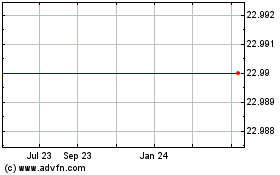A controversial practice that has kept some big movies from
playing at certain theaters appears headed toward a crossroads, as
a major Hollywood studio has told exhibitors it would no longer
grant their requests for exclusive screening rights.
Twentieth Century Fox executives have told theater owners in
recent days that they would no longer entertain requests for
"clearance," which allows theaters to show a movie exclusively in
markets where a competitor is located nearby. It is a rare occasion
on which a Hollywood studio has set an official policy on the
practice.
"We like to have choices for consumers and we think it will grow
the pie," said Chris Aronson, Fox's president of domestic
distribution.
Fox has told theater owners that its policy change would go into
effect with the release of highly anticipated "X-Men: Apocalypse,"
which comes out on May 27. 21st Century Fox, which owns the studio,
and News Corp, owner of The Wall Street Journal, were until
mid-2013 part of the same company.
Clearance affects a small number of the nation's 40,000 screens,
but it has created a major rift in the theatrical business as
smaller operators claim they are being denied certain movies that
bigger chains want.
Debates over clearance have heated up over the past two years.
Several small exhibitors have sued larger rivals over the practice,
and the Justice Department's antitrust division has been
interviewing theater executives about it for more than a year. The
agency has told theater chains to turn over documents related to
the matter, but it is unclear whether a formal investigation is
under way. The Justice Department declined to comment.
Fox made the decision in part to "keep us out of any
litigation," said Mr. Aronson.
Studios have the power to grant or deny clearance requests from
exhibitors, and often theaters will refuse to play a movie in a
market where their request is denied.
Clearance can be requested in markets where larger circuits
compete with smaller operators and in places where major chains
compete with one another.
Some smaller chains say they have been forced out of business
because clearance requests deprived them of so many movies.
Houston-based Viva Cinema closed in 2013 after it said it was
forced to fill screens with movies like "The Croods" and "World War
Z" months after they had left most theaters.
IPic Entertainment Holdings Inc., a smaller movie-theater chain,
is suing AMC Entertainment Holdings Inc. and Regal Entertainment
Group over the practice. IPic said it couldn't book several recent
titles in some locations, including the Fox blockbusters "The
Revenant" and "The Martian."
AMC didn't provide updated comment on the iPic case, but at the
time of the lawsuit filing last year, an AMC spokesman said,
"Allocated film zones have demonstrated benefit to all
stakeholders—moviegoers, studios and exhibitors." Regal
representatives didn't respond to a request for comment.
Regal and AMC, the nation's largest and second-largest theater
chains, respectively, have in the past opted not to show movies in
markets where their clearance requests are denied.
"Clearances have been a long-standing industry practice for
decades. However, AMC is confident that we will thrive and prosper
whether clearances continue or not," said AMC Chief Executive Adam
Aron. The company didn't comment on how it would specifically
respond to Fox's plan.
By saying it won't honor any requests as a policy, Fox runs the
risk that the biggest theater chains will decide not to show the
studio's movies in some markets.
"That's their prerogative," Mr. Aronson said of that
possibility, though he questioned whether theaters would really
forego big titles. "It's hard to have revenue if you don't have
product."
Fox's decision is the strongest stance taken by a distributor
yet, though other studios have shown more reluctance to granting
clearance requests as the controversy has heated up, exhibitors
say.
Fox's move could lead to a moment of reckoning on the issue. If
other studios follow suit, it could present a new calculus that
causes clearance to fade away by virtue of exhibitors needing
movies to fill seats.
Fox's policy change was cheered by exhibitors who have spoken
out against the practice.
"The concepts of clearances are antiquated and don't apply to
modern-day society," said Hamid Hashemi, CEO of iPic
Entertainment.
Contributing to Fox's decision: changing trends in moviegoing.
Many major chains have begun retrofitting auditoriums with plush,
wide recliners and other amenities. Such upgrades tend to lead to
increased attendance even though they can significantly decrease
the number of seats.
That reduced capacity means it is harder for studios to grant
clearance requests, since they now might need two theaters showing
a title to reach the same number of viewers as one traditional
auditorium, said Mr. Aronson.
"This business has changed an awful lot," said Mr. Aronson.
"This is a legacy practice and the time has come to move on."
Write to Erich Schwartzel at erich.schwartzel@wsj.com
(END) Dow Jones Newswires
March 30, 2016 22:15 ET (02:15 GMT)
Copyright (c) 2016 Dow Jones & Company, Inc.
Regal Entertainment (NYSE:RGC)
Historical Stock Chart
From Mar 2024 to Apr 2024

Regal Entertainment (NYSE:RGC)
Historical Stock Chart
From Apr 2023 to Apr 2024
